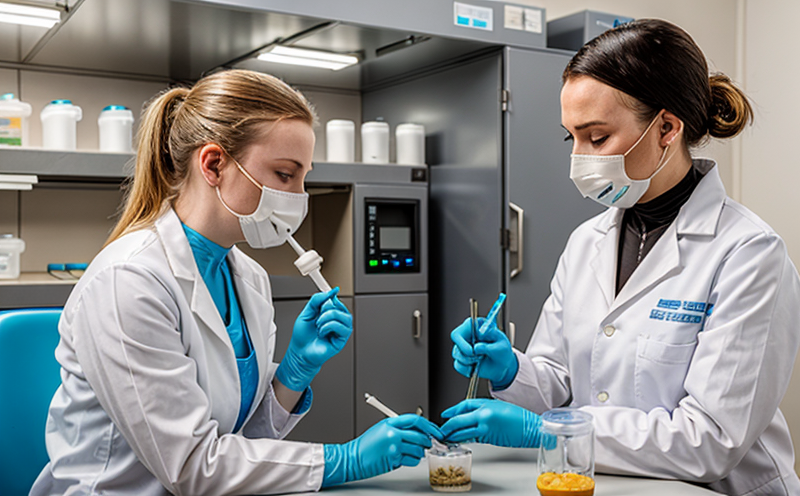ISO 61403 Fumonisin Residue Analysis in Tortilla Products
The presence of fumonisins in food and feed products poses significant health risks, particularly to humans and animals. Fumonisins are toxic secondary metabolites produced by certain species of Fusarium fungi. They can contaminate various agricultural commodities, including corn, which is a key ingredient in tortilla production. Tortillas made from contaminated corn may lead to serious health conditions such as esophageal cancer, particularly in regions where corn is the staple food.
The ISO 61403 standard provides robust guidelines for the detection and quantification of fumonisins (B1, B2, and B3) residues in food products. This service ensures that tortilla manufacturers comply with stringent regulatory requirements, enhancing consumer safety and maintaining brand integrity.
The process begins with the careful selection of samples for testing. Tortillas are cut into small pieces to ensure a representative sample. The chosen sample undergoes thorough extraction using a suitable solvent, typically methanol-water mixtures. This step liberates fumonisins from their bound forms within the tortilla matrix.
Following extraction, the analytes are purified and concentrated through liquid-liquid extraction or solid-phase cleanup methods. The purified extracts are then subjected to high-performance liquid chromatography (HPLC) coupled with tandem mass spectrometry (LC/MS/MS). This instrumentation allows for precise identification and quantification of fumonisins at trace levels.
The standard protocol specifies the limits of detection (LOD) and quantitation (LOQ), which are typically in the range of 1–5 μg/kg. The results are reported according to international standards, including ISO guidelines, ensuring consistency and comparability across different laboratories worldwide.
Our laboratory adheres strictly to ISO 61403, ensuring accurate and reliable fumonisin residue analysis in tortilla products. This service is crucial for quality managers, compliance officers, R&D engineers, and procurement teams who need assurance that their products meet regulatory standards and consumer expectations.
Benefits
- Ensure compliance with international food safety regulations.
- Protect your brand's reputation by maintaining product integrity.
- Enhance consumer trust through transparent labelling practices.
- Avoid costly recalls and legal issues associated with contaminated products.
- Increase market competitiveness by differentiating your products as safe and reliable.
Industry Applications
- FDA compliance for export markets where strict fumonisin limits are enforced.
- Safeguarding food supply chains from contaminated raw materials.
- Supporting research and development in safer tortilla production methods.
- Meeting EU directives on maximum levels of mycotoxins in food products.
Eurolab Advantages
Our laboratory offers unparalleled expertise in fumonisin residue analysis, leveraging state-of-the-art instrumentation and experienced scientists. We provide rapid turnaround times and detailed reports that are essential for your ongoing compliance efforts.
We have a proven track record of delivering accurate results under challenging conditions. Our commitment to quality is reflected in our ISO accreditation and adherence to international standards. Our services extend beyond fumonisin analysis, encompassing other critical mycotoxin assessments as well as comprehensive food safety evaluations.





